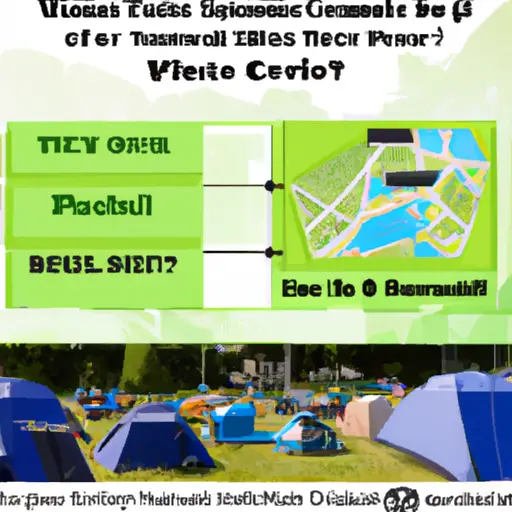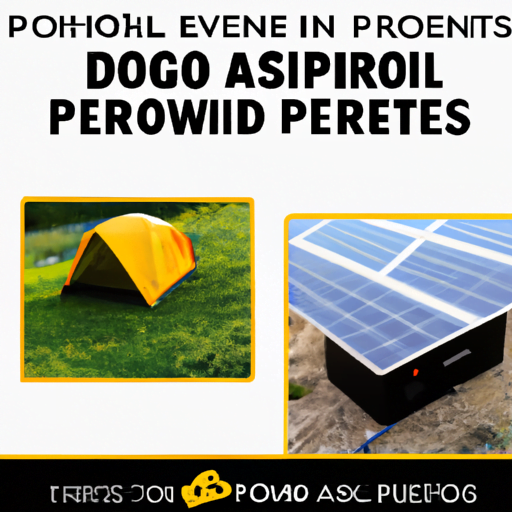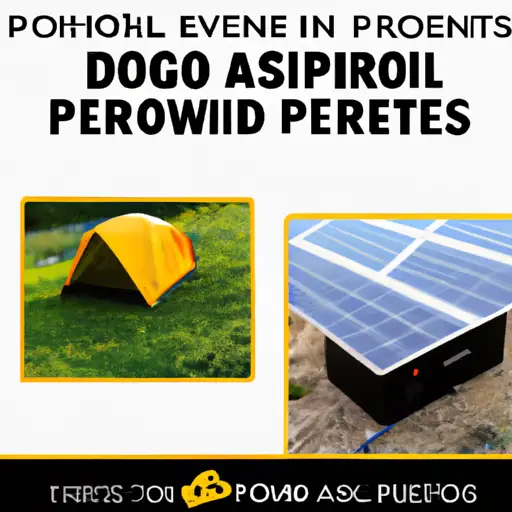So, you’re planning on going off the grid for a camping trip, huh? That’s awesome! There’s nothing quite like disconnecting from the hustle and bustle of everyday life and immersing yourself in nature. But here’s the thing, when you’re out there in the wilderness, you still need some power to keep your gadgets, appliances, and lights running. That’s where choosing the ideal power source for off-grid camping comes into play.
When it comes to off-grid camping, you have a few options for powering your campsite. One popular choice is solar power. These days, solar panels are becoming more affordable and efficient, making them a great choice for campers. All you need is some sunlight, and voila, you’ve got yourself a reliable and renewable source of energy. Plus, solar power is quiet and eco-friendly, so you’ll be doing your part in preserving the environment.
Another option you might consider is a portable generator. These nifty machines run on gasoline or propane and can provide you with a significant amount of power. They’re great for charging your devices, running appliances, and even powering your RV if you’re camping in one. However, generators can be noisy and emit fumes, so keep that in mind if you’re concerned about peace and fresh air.
In an upcoming article, we’ll dive deeper into the pros and cons of each power source and help you make an informed decision on which one is the ideal fit for your off-grid camping adventure. We’ll discuss factors like convenience, cost, efficiency, and environmental impact, so stay tuned to learn more about choosing the perfect power source for your upcoming off-grid camping experience. Happy camping! When it comes to off-grid camping, one of the most important considerations is choosing the ideal power source. Living off the grid offers a unique and adventurous experience, but it also presents its own set of challenges. In this article, we will explore the benefits and challenges of living off the grid, along with some helpful tips for successful off-grid living. We will also delve into the concept of off-grid camping and its benefits, as well as popular destinations for this type of camping. Finally, we will discuss the importance of having a reliable power source for off-grid camping and explore different types of power sources available in the market, along with their pros and cons.
Benefits of living off grid
Living off the grid can be an incredibly rewarding and fulfilling experience. One of the major benefits is the independence it provides. You are not reliant on external sources for your basic needs such as electricity, water, and even food. This self-sustainability can lead to a sense of freedom and empowerment.
Living off the grid also allows you to reconnect with nature. Instead of being surrounded by the hustle and bustle of city life, you can enjoy the tranquility and beauty of the great outdoors. This can be particularly beneficial for your mental and physical well-being.
Furthermore, living off the grid often means reducing your carbon footprint. By being mindful of your energy consumption and utilizing renewable energy sources, you are actively contributing to a cleaner and more sustainable environment.
Challenges of living off grid
While the benefits of off-grid living are enticing, there are also challenges that come along with it. One of the main challenges is acquiring and maintaining a reliable power source. Since you won’t have access to traditional grid-based electricity, you need to find alternative sources to power your appliances, lights, and other electrical devices.
Another challenge is obtaining clean, potable water. Depending on your location, it may be necessary to dig a well or collect rainwater for your water needs. This requires careful planning and management to ensure a sufficient supply.
Additionally, off-grid living often requires a significant investment upfront. Setting up a reliable power system and securing alternative water sources can be costly. However, many off-grid dwellers find that the long-term savings and overall benefits outweigh the initial expenses.
Tips for successful off-grid living
Living off the grid successfully requires careful planning and preparation. Here are some tips to help you make the most of your off-grid experience:
- Research and gather information about the area you plan to live in. Understand the climate, local regulations, and available resources.
- Invest in high-quality and energy-efficient appliances. This will help you maximize your power usage and minimize waste.
- Practice energy conservation. Be mindful of your electricity usage and find ways to reduce consumption, such as using LED lights and turning off appliances when not in use.
- Develop a backup plan. Although you may have a reliable power system in place, it’s always wise to have a backup option, such as a generator or solar charger.
- Join off-grid living communities or forums to connect with like-minded individuals and gain valuable knowledge and support.
Understanding off-grid camping
Off-grid camping, also known as boondocking, is a type of camping where you go completely off the grid and rely on your own resources for survival. It involves camping in remote areas without access to traditional amenities such as electricity, running water, or sewage systems.
Benefits of off-grid camping
Off-grid camping offers a unique and immersive experience in nature. You have the freedom to choose secluded and beautiful locations that may not be available in traditional campgrounds. Additionally, off-grid camping allows you to disconnect from modern technology and truly appreciate the simplicity of outdoor living.
This type of camping also encourages self-sufficiency and resourcefulness. You learn to adapt to your surroundings and rely on your own skills and knowledge to meet your basic needs. It can be a great way to develop problem-solving abilities and enhance your survival skills.
Popular destinations for off-grid camping
Off-grid camping is becoming increasingly popular among outdoor enthusiasts. Here are some popular destinations for off-grid camping:
- Mojave National Preserve, California: This vast desert wilderness offers stunning landscapes and plenty of opportunities for off-grid camping. You can explore unique rock formations, hike along picturesque trails, and stargaze under clear night skies.
- Olympic National Park, Washington: Known for its diverse ecosystems, Olympic National Park is a paradise for off-grid campers. You can camp in the remote Hoh Rainforest, hike through the majestic mountains, or relax on the pristine beaches.
- Joshua Tree National Park, California: With its iconic Joshua trees and otherworldly rock formations, Joshua Tree National Park offers a surreal and captivating off-grid camping experience. You can enjoy rock climbing, stargazing, and peaceful solitude in this desert oasis.
- Big Bend National Park, Texas: Situated along the Rio Grande River, Big Bend National Park is a rugged and remote destination for off-grid camping. Here, you can explore canyons, soak in natural hot springs, and spot diverse wildlife in their natural habitats.

Importance of Power Source
When it comes to off-grid camping, having a reliable power source is of utmost importance. It allows you to power essential appliances and devices, ensuring your comfort and safety in the wilderness. In this section, we will explore why a power source is crucial for off-grid camping and discuss the factors to consider when choosing one.
Why is a power source important for off-grid camping?
Having a power source is essential for several reasons. First and foremost, it enables you to power your lights, which is crucial for visibility and safety, especially during nighttime. Additionally, a power source allows you to charge your electronic devices such as smartphones, GPS units, and cameras, enabling you to stay connected and capture memories of your off-grid adventure.
Moreover, a power source is necessary for operating essential camping appliances such as a refrigerator, portable stoves, and water pumps. These appliances play a vital role in providing food, cooking, and clean water, making your camping experience more comfortable and enjoyable.
Factors to consider when choosing a power source
When selecting a power source for off-grid camping, there are several factors to consider:
- Energy requirements: Determine your energy needs. Calculate the wattage of the appliances and devices you plan to power to ensure the power source can meet those demands.
- Mobility: Consider the portability of the power source. If you plan to move frequently or embark on hiking or backpacking trips, a lightweight and portable option is essential.
- Noise level: Some power sources generate noise, such as gasoline generators. If you value peace and quiet during your off-grid camping experience, you may want to opt for quieter options like solar or wind power.
- Environmental impact: If sustainability is a priority for you, choose a power source that utilizes renewable energy, such as solar or wind power. These options have a minimal environmental impact compared to fossil fuel-based generators.
- Cost: Consider your budget when selecting a power source. Different options have varying costs, including upfront expenses and ongoing maintenance costs. Evaluate the long-term cost-effectiveness of each option to make an informed decision.
By considering these factors, you can choose the ideal power source that suits your specific needs and preferences.

Types of Power Sources
When it comes to off-grid camping, there are several types of power sources available. Each comes with its own advantages and disadvantages. Let’s explore some of the common power sources used in off-grid camping:
Solar power
Solar power is a popular and environmentally friendly choice for off-grid camping. It harnesses energy from the sun and converts it into electricity through solar panels. Solar power offers several advantages:
- Clean and renewable: Solar power is a clean and sustainable energy source. It does not produce greenhouse gas emissions or contribute to air pollution, making it an eco-friendly option.
- Quiet operation: Solar panels operate silently, ensuring a peaceful camping experience.
- Low maintenance: Once installed, solar panels require minimal maintenance. They have no moving parts and do not require frequent refueling or oil changes like generators.
However, solar power also has some drawbacks:
- Dependent on sunlight: Solar power relies on sunlight to generate electricity. Therefore, it is not suitable for areas with limited sunshine or during cloudy days.
- Initial cost: The initial cost of setting up a solar power system can be high. However, it can provide long-term savings on energy bills.
- Limited power output: The power output of solar panels may be limited, especially during winter or in shaded areas. It is crucial to evaluate your energy needs and ensure that solar power can meet them.
Wind power
Wind power utilizes the energy from the wind to generate electricity. It involves using a wind turbine to convert kinetic energy into electrical energy. Here are some advantages of wind power:
- Reliable and constant: Wind energy is available as long as there is wind, making it a dependable power source, especially in windy areas.
- Scalable: Wind turbines come in different sizes, allowing you to choose the right capacity to meet your energy needs.
- Can complement solar power: Wind power can serve as a backup or complement to solar power, providing electricity when solar energy is limited.
Despite its benefits, wind power also has some disadvantages:
- Noise and visual impact: Wind turbines can produce noise, which may disrupt the tranquility of your camping experience. Additionally, they can be visually imposing, detracting from the natural beauty of the surroundings.
- Site requirements: Wind turbines require a specific area with consistent wind flow. It may not be feasible or practical to set up wind power in all camping locations.
- Maintenance needs: Wind turbines require periodic maintenance and inspections to ensure optimal performance. This can be a challenge in remote camping areas.
Hydro power
Hydro power is generated by harnessing the energy of flowing water. It involves setting up a micro hydroelectric system that converts the mechanical energy of flowing water into electrical energy. Here are some advantages of hydro power:
- Reliable and constant: As long as there is a steady flow of water, hydro power can provide a consistent source of electricity.
- Low environmental impact: Hydro power is a clean and renewable energy source. It does not generate greenhouse gas emissions or contribute to air pollution.
- Scalable: Hydroelectric systems can be customized to meet your specific energy needs, making them suitable for off-grid camping.
However, hydro power also has some disadvantages:
- Location-dependent: Hydroelectric systems require access to a water source with sufficient flow. This may limit the availability of hydro power in certain camping locations.
- Complex installation: Setting up a hydroelectric system can be challenging and may require professional assistance. It involves diverting water, installing turbines, and setting up electrical connections.
Gasoline generators
Gasoline generators are a traditional and widely used power source for off-grid camping. They operate by burning gasoline to produce electricity. Here are some advantages of gasoline generators:
- High power output: Gasoline generators offer high power output, making them suitable for running multiple appliances simultaneously.
- Readily available fuel: Gasoline is readily available in most areas, making it convenient for refueling during camping trips.
- Portable options: Gasoline generators come in various sizes, including portable options that are easy to transport.
However, gasoline generators also have some drawbacks:
- Noise and emissions: Gasoline generators are noisy and produce exhaust emissions. This can impact the tranquility of the camping experience and contribute to air pollution.
- Fuel dependency: Gasoline generators require a constant supply of fuel, which may not be practical or readily available in remote camping locations.
- Maintenance needs: Gasoline generators require regular maintenance, including oil changes and spark plug replacements. Neglecting maintenance can lead to reduced performance and reliability.
Propane generators
Propane generators utilize propane gas to produce electricity. Propane is stored in tanks and burned to generate power. Here are some advantages of propane generators:
- Cleaner burning: Propane generators produce fewer emissions and pollutants compared to gasoline generators. They offer a cleaner and more environmentally friendly option.
- Longer shelf life: Propane has a longer shelf life than gasoline, making it a suitable choice for long camping trips or emergency situations.
- Quiet operation: Propane generators typically run quieter than gasoline generators, providing a more peaceful camping experience.
However, propane generators also have some disadvantages:
- Limited fuel availability: Propane may not be as readily available as gasoline in all camping locations. It is essential to plan your fuel supply accordingly.
- Lower power output: Propane generators often have a lower power output compared to gasoline generators. They may not be suitable for high-demand appliances or devices.
- Higher upfront cost: Propane generators can be more expensive to purchase initially compared to gasoline generators. However, they may offer long-term cost savings due to lower fuel consumption and maintenance requirements.

Conclusion
Choosing the ideal power source for off-grid camping is a crucial decision that can greatly impact your camping experience. Whether you opt for solar power, wind power, hydro power, gasoline generators, or propane generators, each option comes with its own set of advantages and disadvantages. Consider your energy requirements, mobility needs, environmental impact concerns, noise preferences, and budget when making your decision.
Living off the grid and embarking on off-grid camping adventures can provide a sense of freedom, self-sustainability, and connection with nature. By selecting the right power source, you can enhance your off-grid experience and enjoy the beauty and serenity of the great outdoors while still enjoying the comforts and convenience of modern amenities. So, pack your camping gear, choose your ideal power source, and get ready for an off-grid adventure like no other!





